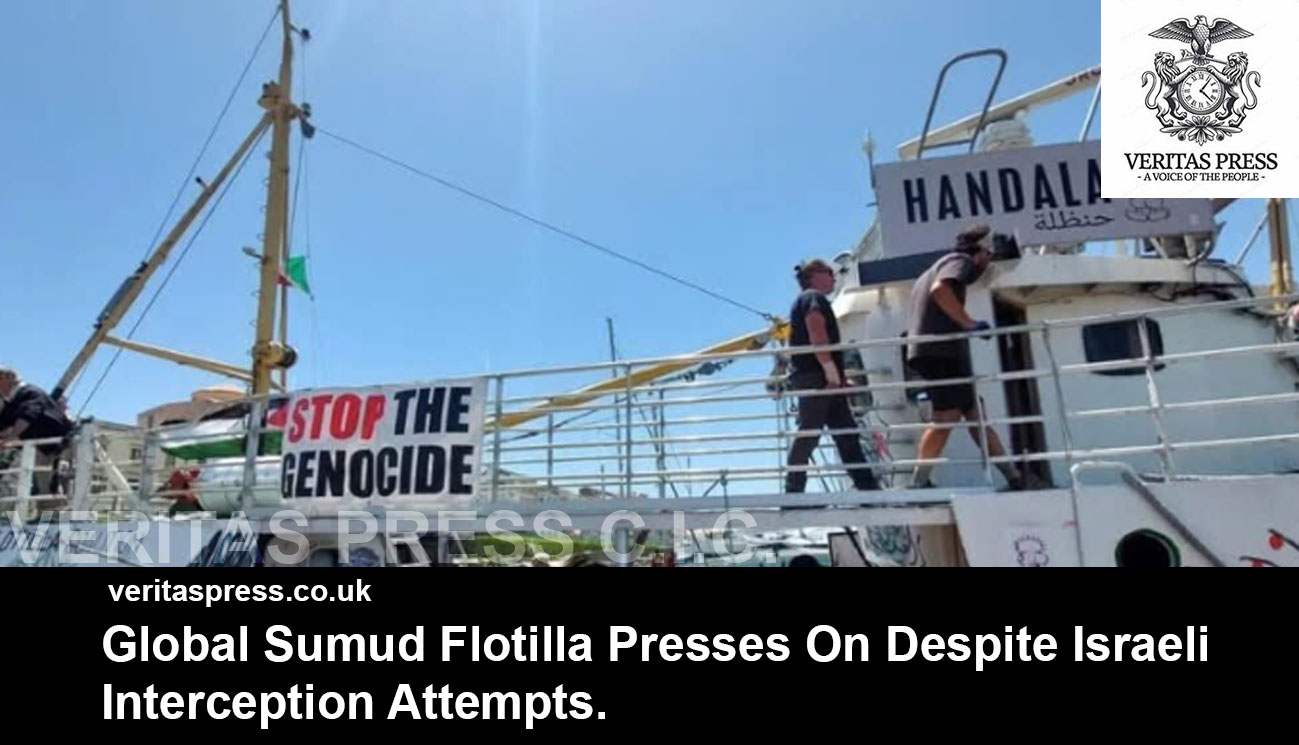The Global Sumud Flotilla, a coalition of over 40 civilian vessels carrying more than 500 activists from around 45 countries, continues its mission to deliver humanitarian aid to Gaza, despite recent interception attempts by the Israeli Navy.
Israeli Navy’s Interception Attempts:
On October 1, 2025, the flotilla’s lead vessel, Alma, was approached by Israeli naval ships that came within five meters, jamming its communication systems and disabling its engine. In response, participants aboard Alma followed established security protocols, including discarding their phones into the sea to prevent tracking. Despite this, the remaining vessels in the flotilla continued their course toward Gaza.
Subsequently, Israeli forces attempted to intercept another lead vessel, Sirius. However, as reported by Wael Naouar, spokesperson for the flotilla’s Maghreb branch, “The Zionist (Israeli) vessels today intercepted Alma, the lead ship, but the other ships ignored Alma and continued toward Gaza.” He added that when the flotilla regrouped around Sirius, the Israeli navy shifted focus there but was met with the same result: “the rest of the flotilla ignored Sirius and continued their journey to Gaza.”
International Reactions And Support:
The flotilla’s efforts have garnered support from various international figures and organisations. UN Special Rapporteur on the Palestinian Territories, Francesca Albanese, expressed solidarity with the flotilla, stating, “I understand you are heading to Gaza. We support you, and you will not face this journey alone.” Additionally, she criticised the Italian government’s decision to withdraw naval support, labelling it as an abandonment of the humanitarian mission.
The Australian government has also expressed concern for the safety of its citizens aboard the flotilla. Assistant Foreign Minister Matt Thistlethwaite emphasised the importance of respecting international law and condemned alleged drone attacks on the flotilla. Australians aboard, including filmmaker Juliet Lamont and activist Surya McEwen, have remained calm and committed to their mission, highlighting the peaceful and humanitarian nature of their effort.
Challenges And Determination:
Despite facing significant challenges, including threats of interception and harassment at sea, the flotilla remains resolute in its mission. Zeynel Abidin Ozkan, an activist aboard the Adagio, reported that drones were flying intensively over the fleet overnight, and at around 5 am, two ships not part of the flotilla approached and launched a cyberattack on the GPS and internet database of Alma, cutting off communication. Metehan Sari, another activist aboard Alma, described this as “one of the biggest acts of harassment so far,” but reaffirmed their commitment to the mission.
Legal And Ethical Considerations:
The Israeli Navy’s actions raise significant questions regarding international maritime law. According to Al Jazeera, Israel’s interception attempts in international waters may violate the United Nations Convention on the Law of the Sea, which prohibits interference with vessels engaged in peaceful activities in international waters. Furthermore, the flotilla’s mission aligns with the principles of humanitarian assistance under international law, emphasising the right to provide aid to populations in need.
Conclusion:
The Global Sumud Flotilla’s unwavering determination to deliver humanitarian aid to Gaza underscores the resilience of civil society in the face of adversity. Despite facing interception attempts and international pressure, the flotilla continues its journey, highlighting the ongoing humanitarian crisis in Gaza and the need for international support and intervention.
As the flotilla approaches Gaza’s territorial waters, the international community watches closely, with many advocating for the protection of the flotilla and the delivery of aid to those in need. The outcome of this mission may have significant implications for future humanitarian efforts in conflict zones.
Advertisements
Tags:




























